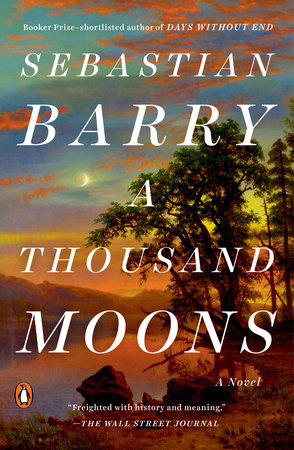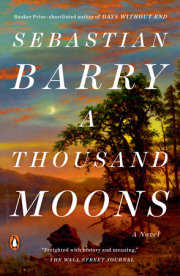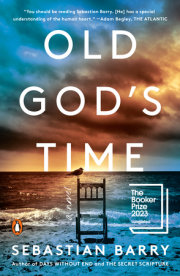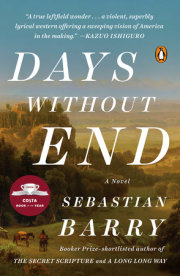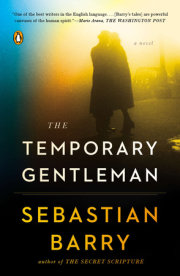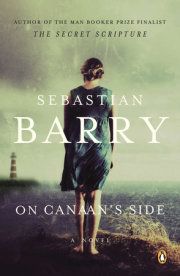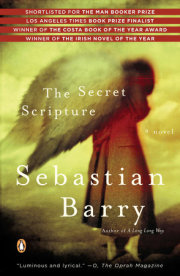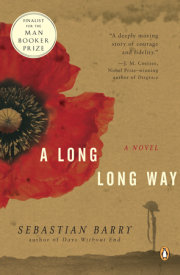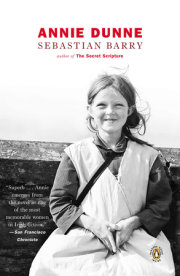Chapter One
z
I am Winona.
In early times I was Ojinjintka, which means rose. Thomas McNulty tried very hard to say this name, but he failed, and so he gave me my dead cousin's name because it was easier in his mouth. Winona means first-born. I was not first-born.
My mother, my elder sister, my cousins, my aunts, all were killed. They were souls of the Lakota that used to live on those old plains. I wasn't too young to remember - maybe I was six or seven - but all the same I didn't remember. I knew it happened because afterwards the soldiers brought me into the fort and I was an orphan.
A little girl can suffer many a seachange. By the time I got back to my people, I couldn't converse with them. I remember sitting in the teepee with the other women and not being able to answer them. By that time I was all of thirteen or so. After a few days I found the words again. The women rushed forward and embraced me as though I had only just arrived to them that very moment. Only when I spoke our language could they really see me. Then Thomas McNulty came to get me again and took me back to Tennessee.
Even when you come out of bloodshed and disaster in the end you have got to learn to live. You have to look about you, see how things are, grow things or buy things as the case may be.
The little town near by us in Tennessee was called Paris. Lige Magan's farm was about seven miles out. It was quite a few years after the war but the town was still full of rough Union soldiers kicking their heels, and the defeated butternut boys were a sort of secret presence, though they were not in their uniforms. Vagabonds on every little byway. And state militia watchful for those vagabonds.
It was a town of many eyes watching you anyhow, an uneasy place.
To present yourself in a dry-goods store to buy items you have got to have best English or something else happens. At the fort Mrs Neale had given me my first English words. In later times John Cole got me two books of grammar. I looked at them long and good.
It is bad enough being an Indian without talking like a raven. The white folks in Paris were not all good speakers themselves. Some were from other places. Germans, Swedes. Some were Irish like Thomas McNulty, and only got to English when they got to America.
But myself being a young Indian woman I guess I had to talk like an empress. Of course I could have offered my list of items that Rosalee Bouguereau, who worked on Lige's farm, had written out. But it was better to speak.
Else what was happening was, I was going to be beaten up every time I was in town. It was English kept me from that. Some straggly farmhand might look at you and see the dark skin and the black hair and think that gave him a right to knock you down and kick you. No one saying boo to him for that. No sheriff or deputy neither.
It wasn't a crime to beat an Indian, not at all.
John Cole, even though he had been out as a soldier and was a good farmer, got bad treatment in town because his grandmother or the woman before his grandmother was an Indian person. So that was writ in his face a little. Even English couldn't protect him. Because he was a big grown man maybe, he couldn't hope for mercy just all the time. He had a lovely face as people attested in especial Thomas McNulty but I guess the townsmen could sometimes see the Indian in it. They beat him so bad and then he was just a plank of suffering in the bed and Thomas McNulty swearing he would go in and kill someone.
But Thomas McNulty's shortcoming was he was poor. We were all poor. Lige Magan was poor enough, and he owned the farm, and we were poor underneath Lige.
Poor worse than Lige.
When a poor person does anything he has to do it quietly. When a poor person kills, for instance, he has got to do it very quietly and run as fast as those little deer that float out of the woods.
Also, Thomas had been in Leavenworth prison for desertion, so the uniforms about the town made him jumpy, even though he always said he loved the army.
I myself was lower than Rosalee Bouguereau. She was a black-skinned saint of a woman let me tell you. She used to go out and shoot rabbits with her brother's rifle along the back woods of Lige's farm there. In the famous battle with Tach Petrie - famous to us anyhow, when he and his accomplices had tried to rob us, advancing on our homestead with implacable intent - she distinguished herself by reloading the rifles faster than ever was - so said John Cole.
But she was a slave before the war and a slave is low down in the eyes of white folks of course.
So I was lower than that.
I was just the cinders of an Indian fire in the eyes of the town. Indians in bulk were long gone from Henry County. Cherokee. Chickasaw. Folks didn't like to see an ember drifting back.
In the eyes of the Great Mystery we were all souls alike. Trying to make our souls skinny enough to squeeze into paradise. That's what my mother said. Everything I remember of my mother is like the little pouch of things that a child carries to hold what is precious to her. When such a love is touched by Death then something deeper even than Death grows in your heart. My mother fussed over us, myself and my sister. She was interested in how fast we could run, and how high we could jump, and she never tired of telling us how pretty we were. We were just little girls, out there on the plains, under the starlight.
Thomas McNulty sometimes liked to tell me I was as pretty as the things he thought were pretty - roses, robins and the like. It was mother's talk he was doing since I had no mother then. It was strange that in the old wars he had killed many of my people when he was a soldier. He might have killed even some of my own family, he didn't know.
'I was too young to remember,' I would say to him. Of course I hadn't been, but it came to the same thing.
It used to make me feel very strange listening to him talk about that. I would start to burn from the centre of my body. I had my own little pearl-handled gun that the poet McSweny gave me in Grand Rapids. I could have shot Thomas with that. Sometimes I thought I should shoot something - shoot someone. Of course I did shoot one of Tach Petrie's men, not actually during the famous battle, but another time, when they accosted us on the road - right through the chest. And he shot me, but it was only a bruise, not a wound.
I had the wound of being a lost child. Thing was it was they that healed me, Thomas McNulty and John Cole. They had done their damnedest I guess. So they both gave me the wound and healed it, which is a hard fact in its way.
I guess I had no choice in the matter. Once your mother is taken from you you can't ever catch up with her again. You can't cry out 'Wait for me' when the winds turn cold under a wolf moon and she has walked far ahead of you across the grasses searching for wood.
So Thomas McNulty rescued me twice. The second time, as Thomas ventured back through the battlefield with me in tow, dressed as it happened as a drummer boy, Starling Carlton wanted to kill me, right there. We bumped into him. He was waving his sword and shouting. He said all the Indians had to be killed, it was the major's orders, and he was going to do just that. So Thomas McNulty had to kill him instead. Thomas was very sad about that. They had been soldiers together a long time.
I remembered all of that clearly enough.
Oftentimes as a girl I would cry for no reason. I would drift away and find a secluded spot. There I would let the tears loose and it might be so dark behind my eyes it was as if I had fallen blind. John Cole would come look for me. And he had the sense to put an arm about me and not to ask me to say anything I had no words for, English or Lakota.
John Cole. A lot of his love for me was expressed in practical things. He got me the books with grammar as I said and set to teaching me even though he hadn't too much learning himself. Not just letters but numbers too he taught me.
When Lige Magan thought I was ready he went and asked about employment with his friend the lawyer Briscoe. All that sort of work I did a good while, writing and reckoning numbers. I was so proud to do it.
The lawyer Briscoe had a fine house and a garden with flowers that didn't belong to Tennessee, roses from England mostly. He wrote a book about his roses that was printed in Memphis. It took pride of place in his office.
Ojinjintka means rose as I said. I don't know what sort of rose. Maybe a lost prairie rose.
Not a true rose like one of the lawyer Briscoe's. A rose to my people.
The lawyer Briscoe pressed on me cherished books. I carried them home and read them in the parlour by the stove. The breeze from the meadow touching and touching the pages. Those pleasant evenings when there was nothing to do only listen to Rosalee's beloved brother Tennyson Bouguereau singing those old songs he knew. Myself sunk in thoughts. Those thoughts that books bring to mind.
Of course that was all before Jas Jonski. A boy that never read a book, come to think of it. Could barely write a letter.
1870s it all must have been, after the war, and after Thomas got home from prison. It might even have been the year that General Custer was killed. Or just before.
But all the years went by fleet of foot. Like ponies running across the endless grasses.
Chapter Two
z
Jas Jonski was the clerk in the dry-goods store. He worked for a miserable ghost of a man called Mr Hicks. The first time I stepped into the store, I knew he liked me.
'You John Cole's daughter,' he said, without a trace of fear.
'How you know I John Cole's daughter?' I said. For my part it was worrying even to be recognised.
He said that last fall he had brought out some heavy supplies in the wagon and he wondered that I didn't remember as he had complimented me.
'You're even prettier now,' he said, brave as you like.
I didn't know what to say to him. In its own way it was like a sudden ambush. I was ready to defend myself. Thomas McNulty said a girl had to be sure and know how to use her knife, how to use her little pistol, all that. I had a thin little steel knife also in the hem of my petticoat, if the gun failed me. It was English steel. Thomas McNulty showed me all the best places to stick in a knife if you want to stop someone.
But every time I went into town for supplies, he was pleasant to me. As if maybe there was someone in town now to trust. There was something between us but I had no name for it. It seemed a good thing. I began to look forward to seeing him and I used to hurry the mules along to get there, much to their annoyance.
Yes, Jas Jonski was very sweet on me and after six months of measuring out cane sugar for me, and all the rest, my wagon lost a wheel and he ran me out to Lige Magan's place, and got talking to Thomas McNulty. Thomas McNulty would talk to the devil so Jas Jonski had no trouble with him. So Thomas McNulty and John Cole began to know who he was. I never saw John Cole look at someone with less admiration.
But Jas Jonski was either blind or in love and he didn't seem to notice. He started to come out to the farm regular and when he found out that Thomas McNulty liked this expensive molasses that came up from New Orleans, he used to bring a pot of that sometimes. He would sit there beaming and talking, and Thomas scooping out the molasses with a twig like a bear, and John Cole scowling and saying nothing. John Cole could take or leave molasses, unless it was the cheap stuff was put into the tobacco after the harvest. Jas Jonski beaming, like a sun that just wouldn't set no matter how dark the evening.
'I like the town,' Jas Jonski said to John Cole, 'but I sure do like all this countryside too.'
John Cole didn't say anything.
The most John Cole would allow of courtship was Jas Jonski walking me ten minutes in the wood. I wasn't even allowed to hold his hand. Jas Jonski's modest ambition was to own his own store and he also talked vaguely about moving to Nashville where he had family. Not a few times he stopped and stood me in front of him and made declarations. It was exceedingly pleasant to see his face colour up with all his fervent protestations. Just like in the story books he protested his love.
Then Jas Jonski thought he might do well to marry me and he asked me about that. I didn't know how old I was but I guess I wasn't yet seventeen. I was born under the Full Buck Moon, that's all I knew for sure. He said he was nineteen. He was a red-haired boy with a burned-looking face all the year, not just high summer.
It was then John Cole got a red face too. Boiled up like a catfish.
'No, sir, madam,' he said.
I was working for the lawyer Briscoe after all which was an unusual occupation for a girl let alone an Indian. I think John Cole was intending me to be the first Indian president.
Well I thought I might very much like to marry Jas Jonski. Just liked the sound of it. I could sort of see it. I had a picture of it in my mind. I hadn't even kissed him yet but I could see my face tilting up for his kiss. We had held hands when we were out of John Cole's sight.
Copyright © 2020 by Sebastian Barry. All rights reserved. No part of this excerpt may be reproduced or reprinted without permission in writing from the publisher.

